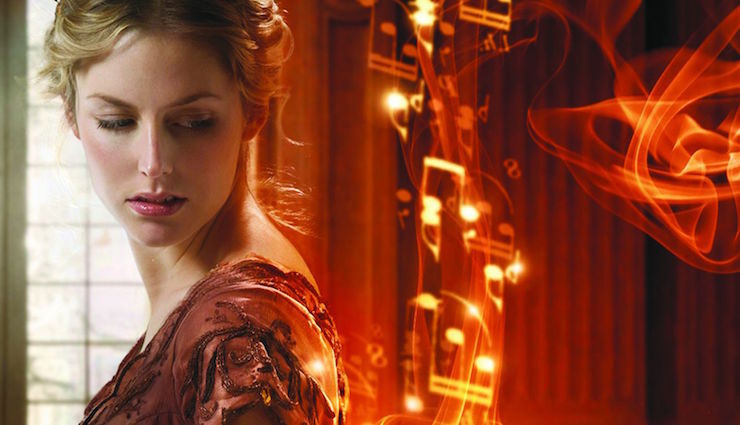Technically, the English Regency—when George IV acted as regent for his father George III—lasted only from 1811 to 1820, yet the period’s popularity in popular culture, especially in genre literature, is much bigger than its brief duration in time would suggest. What makes this period so significant and well-loved?
The Regency period was is a critical hinge point in English history and especially in English culture. It was a time of great social, political, economic, artistic, and technological change, largely driven by the Napoleonic Wars. In addition to the political changes arising from the aftereffects of the American and French Revolutions and the domination of Europe by Napoleon, the Regency saw significant new developments in art, architecture, and fashion, largely driven by the Regent himself; a population boom and corresponding economic expansion; and a vibrant and highly stratified social scene populated by larger-than-life characters like Beau Brummell, Horatio Nelson, Ada Lovelace, and Mary Shelley. All of these things make it a significant and emotionally resonant era and a great time period for historical fiction.
One of the most significant technological innovations of the period was the steam-powered printing press, which drove the rise of fashionable novels—including romans à clef written anonymously by members of the aristocracy—which made the lives of the rich widely available as popular entertainment for the lower classes. These cheap and popular novels, many of which were published after the Regency ended, cemented the life of the upper classes in the Regency as a specific literary genre, and shaped the future growth of the novel itself.
Much of the credit, or blame, for the Regency’s popularity today can be laid at the feet of Georgette Heyer, who popularized a certain view of the period through her Regency romances, beginning with Regency Buck in 1935, which became best-sellers in the UK, US, and elsewhere in the 1950s and 1960s. Heyer combined historical accuracy with the verve, wit, and humor of Jane Austen, but also added a twentieth-century sensibility and certain quirks (such as a specific set of slang) that flavored the public’s understanding of the period for a generation. I haven’t read Heyer myself [hangs head in shame] but there’s no question her influence is wide and pervasive.
Here are five books about the Regency, which are among my favorites and influenced my “Regency interplanetary airship adventure” novel Arabella of Mars.
Our Tempestuous Day: A History Of Regency England by Carolly Erickson
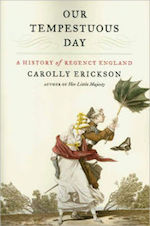 I’d like to lead off with a non-fiction title, because the actual Regency is so much richer and weirder than anything you’ll find in fiction. This is a particularly lively and readable social history of the era, focused on the larger-than-life personalities such as Lord Byron and the Prince Regent himself. It’s a quick read, and I’d recommend it to anyone interested in the period.
I’d like to lead off with a non-fiction title, because the actual Regency is so much richer and weirder than anything you’ll find in fiction. This is a particularly lively and readable social history of the era, focused on the larger-than-life personalities such as Lord Byron and the Prince Regent himself. It’s a quick read, and I’d recommend it to anyone interested in the period.
Master & Commander by Patrick O’Brian
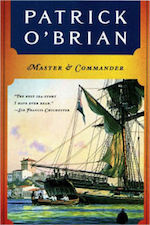 O’Brian’s Aubrey/Maturin books—this is the first in a series of twenty novels—were my own personal introduction to the Napoleonic Wars, and my primary model in writing Arabella of Mars. Painstakingly researched and written in period idiom, these historical novels appeal to many SF readers (despite the lack of any fantastic element) because they incorporate an SF-like degree of worldbuilding that makes them a delicious experience of another place and time. They are also cracking adventures and, like Austen, surprisingly funny.
O’Brian’s Aubrey/Maturin books—this is the first in a series of twenty novels—were my own personal introduction to the Napoleonic Wars, and my primary model in writing Arabella of Mars. Painstakingly researched and written in period idiom, these historical novels appeal to many SF readers (despite the lack of any fantastic element) because they incorporate an SF-like degree of worldbuilding that makes them a delicious experience of another place and time. They are also cracking adventures and, like Austen, surprisingly funny.
Jonathan Strange & Mr Norrell by Susanna Clarke
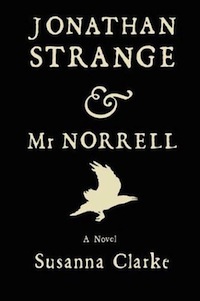 This enormous and beautifully crafted standalone novel (which, though I love every detail, would have been improved by being considerably shorter) combines the actual drama of the Napoleonic Wars with a grand story of the recovery of English magic after a long period of decline. In a sense it makes the Regency even more itself, by amplifying the period’s actual cultural and economic changes with an additional set of magical changes.
This enormous and beautifully crafted standalone novel (which, though I love every detail, would have been improved by being considerably shorter) combines the actual drama of the Napoleonic Wars with a grand story of the recovery of English magic after a long period of decline. In a sense it makes the Regency even more itself, by amplifying the period’s actual cultural and economic changes with an additional set of magical changes.
Shades of Milk & Honey by Mary Robinette Kowal
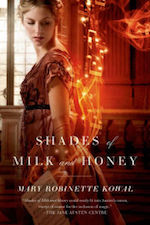 This novel has often, and justifiably, been described as “Jane Austen with magic.” A delightful exploration of the impact of a gentle magic of illusion, called “glamour,” quite in contrast with the warrior magic seen in Jonathan Strange & Mr Norrell, it combines a wonderfully suspenseful romance with a science-fictional extrapolation of the impact of this seemingly minor change on society. This is the first in a series of five, called the Glamourist Histories, and combines rigorous research with a subtle critique of the period’s mores and norms.
This novel has often, and justifiably, been described as “Jane Austen with magic.” A delightful exploration of the impact of a gentle magic of illusion, called “glamour,” quite in contrast with the warrior magic seen in Jonathan Strange & Mr Norrell, it combines a wonderfully suspenseful romance with a science-fictional extrapolation of the impact of this seemingly minor change on society. This is the first in a series of five, called the Glamourist Histories, and combines rigorous research with a subtle critique of the period’s mores and norms.
His Majesty’s Dragon by Naomi Novik
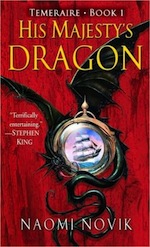 If Shades of Milk & Honey is Jane Austen with magic, this is Patrick O’Brian with dragons. A high-stakes adventure in which our main character, a young sea captain, finds himself forced by circumstance into the aerial corps—a great loss of status—but in compensation gains the deep friendship of a gigantic, powerful, intelligent, but naive flying weapon. This is the first of nine books, which explore the whole world and the length and breadth of the Napoleonic Wars in an alternate history almost unchanged from ours except for the introduction of dragons.
If Shades of Milk & Honey is Jane Austen with magic, this is Patrick O’Brian with dragons. A high-stakes adventure in which our main character, a young sea captain, finds himself forced by circumstance into the aerial corps—a great loss of status—but in compensation gains the deep friendship of a gigantic, powerful, intelligent, but naive flying weapon. This is the first of nine books, which explore the whole world and the length and breadth of the Napoleonic Wars in an alternate history almost unchanged from ours except for the introduction of dragons.
Happy reading!
See Sherwood Smith’s blog post “The Romance of the Regency: Jane Austen, Georgette Heyer, and Silver Fork Novels” for more information on this fascinating topic.
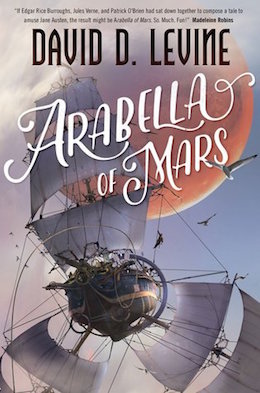 David D. Levine is the author of the novel Arabella of Mars and over fifty science fiction and fantasy stories. His story “Tk’Tk’Tk” won the Hugo Award, and he has been shortlisted for awards including the Hugo, Nebula, Campbell, and Sturgeon. Stories have appeared in Asimov’s, Analog, F&SF, Tor.com, numerous Year’s Best anthologies, and his award-winning collection Space Magic.
David D. Levine is the author of the novel Arabella of Mars and over fifty science fiction and fantasy stories. His story “Tk’Tk’Tk” won the Hugo Award, and he has been shortlisted for awards including the Hugo, Nebula, Campbell, and Sturgeon. Stories have appeared in Asimov’s, Analog, F&SF, Tor.com, numerous Year’s Best anthologies, and his award-winning collection Space Magic.










